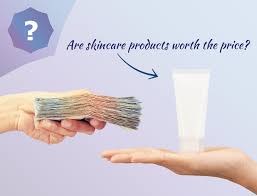
Are Expensive Skincare Products Worth the Price?
Are luxury expensive skincare products worth the cost? Are expensive face serums worth the money? This guide will help you decide when to splurge and when to save on skin care.
The short answer is: It depends on your Baumann Skin Type and what skincare products you need before you can know if skincare products are worth the price.
Its always best to shop according to your Baumann Skin Type.
Are expensive skin care products worth the price?
Example
Hyaluronic acid serums come in many price ranges from cheap to expensive. All of these HA serums probably work the same. So you can save money on HA serums. However, expensive Vitamin C serums are worth the price.
Some skin care products are expensive to make properly, and these expensive skincare products are worth it (IF they are right for your skin type). Other high-end skincare products are not worth it because they are really not anything special and are not different from cheaper skincare products. Many high-end skincare products are expensive because of the celebrity endorsement or packaging, but the actual formulation is not worth the money.
How Do You Know Which Skincare Products to Splurge On?
The easiest way to know if high end skincare is worth it is to take the skin type quiz to find out your Baumann Skin type and get product suggestions from many brands and multiple price points. Our team of doctors is here to help you decide which products are worth the money.
Take the Quiz
16 Bauman Skin Types
Are High-End Skincare Products Worth It?
Why are some skin care products very expensive? Is it because of the ingredients, the packaging, the celerity endorsements, the low supply? The Top 10 skincare brands tend to be the luxury expensive ones. Why is this?
Face serums are usually the most expensive of the skin care products in a routine. They are expensive because of the ingredients and the packaging.
If face serums and other expensive skin care products are worth it depends on many factors.
Things to consider when deciding which skin care products are worth it
Things to consider when deciding which expensive skincare products are worth it
Does it have ingredients that are right for your Baumann Skin Type?
Is there a cheaper skincare option that is well made with the same ingredients?
Is it manufactured and packaged properly to stay effective after being opened?
Does it contain ingredients that help the ingredient penetrate into the skin?
Does it contain ingredients that are expensive but not effective?
Does it contain potable water or USP Purified water?
Skincare Products with Expensive Ingredients that Are Not Worth the Money:
Bee venom
Birds Nest
Caviar
Gold
EGF
Exosomes (plant derived)
Pearls
Some peptides
Snail mucus
Snake venom
Stem Cells
High-end skin care vs drugstore brands
High-End Skincare vs Drugstore
There are many skincare products on the market that seem identical. You will find drugstore brands with the exact same colors and ingredients as more expensive skincare products. Even if the ingredient list is identical, the products may not be the same. The only way to know if a cheap skin care product is as good as an expensive one is to know a lot about how the product was made. Many companies do not divulge this proprietary information. That is why you need medical advice on skincare from experts like me. I have visited the manufacturing facilities, reviewed the source of the skincare ingredients, interviewed the cosmetic chemists, and worked with other dermatologists to test the final products on patients to see if they really work and are worth the money.
Is expensive skin care worth the money?
Is Expensive Skincare Worth the Money?
If skin care is worth it depends upon your skin type, the ingredients, the way the product is manufactured and packaged and the formula (the recipe). The skincare formula is the most important thing to consider when deciding if a skincare product is worth the cost.
The best way to explain this concept is to compare formulating a skincare product to baking cookies. When you compare two different cookie recipes, they may have the exact same ingredients but different recipes. My grandmother’s cookies were better than mine- even when I used the same ingredients. Why is this? Creaming the butter first before adding the sugar, for example, will give a very different result than if the butter is melted before it is mixed with sugar.
Formulating skincare is the same concept as baking- science matters. Every step and how it is performed changes the final result. Waxier lipids like ceramides must be added into the formula at a higher temperature so it is more fluid, however this same high temperature will inactivate the antioxidant power of ingredients like green tea. In order to be done properly- the ceramide is added into a warm formulation and let cool before green tea is added. When and how green tea and ceramide are added into the formulation affects the efficacy of the final product. This is just one of dozens of examples of how the order of ingredients and how they are added affects whether or not the skincare product works.
Other factors that affect if skincare products really work are:
Quality:
Are they made with high-quality ingredients? For example- the efficacy of botanical ingredients differs based on what soil they were grown in. Were they harvested at the right time?
Were they stored properly to keep their properties (such as antioxidant ability) intact?
Does it contain USP Purified water or cheaper potable water?
Product Chemistry:
How good was the cosmetic scientist who formulated the recipe for the product?
Do the ingredients make each other work better or inactivate each other?
Were the correct types of fatty acids chosen? Stearic acid causes different effects than oleic acid for example.
Product Recipe:
Was the recipe used to make them correct?
Were they put in the formulation in the correct order?
Were they put in the formulation in the correct temperature?
Were they stirred at the correct rate?
Were they stirred in an airless light free environment or in an open vat?
What kind of water was used?
Packaging & Storage:
How were they packaged?
Was the formula transferred into tubes, bottles or jars in an airless light free environment?
Were they hand transferred or machine transferred
How long did they sit before the lids were placed on the container?
Product Application Order:
What order will the skincare product be used in the skincare routine?
What goes before and after each product?
What other products will be used with this product. Moisturizers and cleansers can inactivate expensive serums so you must choose the correct ones.
Use research to guide decision making in skin care
Use Research to Guide Decision Making in Skincare
In many situations, less expensive products are just as good as high-end skincare products – the key is finding the best products for YOUR skin.
Take the skin type quiz to find out what ingredients your skin needs and find skincare products that are worth it- because they are customized for your skin type. The quiz is free- the education is free- and it will save you time and money. Once you know your skin type- you will be able to find the most affordable skincare products to include in your skincare routine.
I have been a dermatologist for almost 30 years and have spent hours discussing with my patients when to splurge and when to save on skincare. In most cases, there is a cheaper skincare option. In some cases, however, a unique ingredient that has evidence-based research is the best for your skin type- and if it’s the only option it is worth the price.
My advice is to only buy products that you know are right for your Baumann Skin Type and stick with medical-grade skincare brands that have been tested by dermatologists. Take the first step towards saving money by knowing your Baumann Skin Type.
We will empower you to make better skin care choices and stop wasting money on worthless skincare products that do not work.


